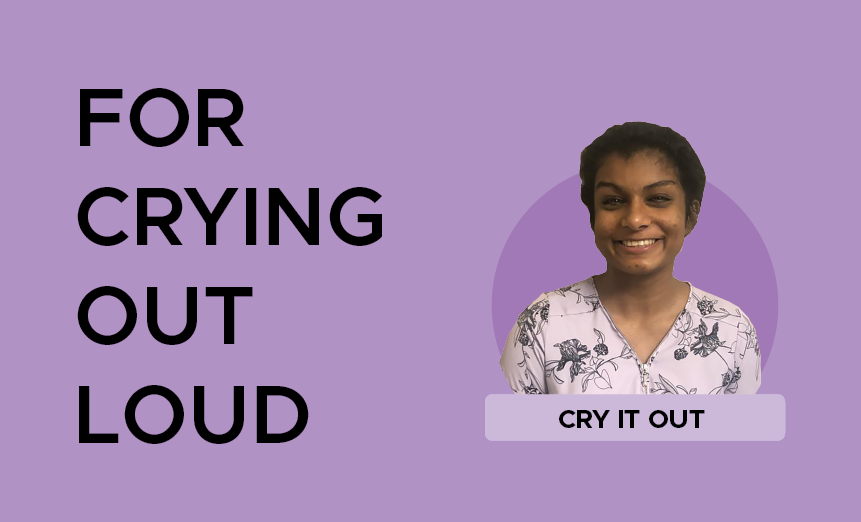The United States is approaching 200,000 COVID-19 deaths; deadly shootings happen every week here in Indiana; racial tensions are rising nationwide over the shootings of African-American people at the hands of police brutality… 2020 is giving us a lot of reasons to cry and sometimes, we humans need to do just that.
The stigma surrounding mental health issues is prevalent in our everyday lives at CHS, from a student sneaking to a bathroom stall to quietly cry to simply not talking about when or how we cope with our emotions. The act of crying is often associated with being “weak” or “unstable,” with many apologizing after a sudden emotional release. In reality, crying is a way that a person can use strength and self-awareness to take charge of their emotions in a human, natural way.
In today’s society, it can seem as if everyone is searching for one endgame: long-lasting, genuine happiness. While prospering in positive emotions is rewarding, negative ones can be hard to avoid. Suppressed stress will find a way to surface one way or another. In particular, the smothering of unfavorable emotions can lead us to partake in unhealthy coping mechanisms like the underage use of illicit drugs and alcohol.
Not only can a crying session after a long repression of emotions feel cathartic, according to Medical News Today, but emotional crying also stimulates the production of “feel good” chemicals such as oxytocin and endorphins. The act of crying initiates the parasympathetic nervous system, detoxifies blood and pioneers changes in the central nervous system, allowing physiological accommodations to restore one’s mood quickly. The bottling up of emotions without any outlets can cause physical stress on the body, leading to cardiovascular distress and high levels of inflammation. Despite all of the positive effects of crying, there is an upper limit. If you or someone you know is crying frequently or exhibiting other symptoms of depression, you may need to talk to a doctor.
The well-rounded human experience consists of feeling a wide array of emotions, including uncomfortable ones. Rethinking the notion of crying as a positive one rather than a negative one can be progressive for one’s emotional intuition, physical health and personal growth in the end. Therefore, the next time you feel like shedding a tear or two, I encourage you to embrace the emotional release as just another step towards living fully. Sometimes, it’s better if we just let it all out so that we are able to shine once again.
The views in this column do not necessarily reflect the views of the HiLite staff. Reach Valliei Chandrakumar at vchandrakumar@hilite.org
Click here to read more work by Valliei Chandrakumar. To read an article on the benefits of crying, click here.

































![AI in films like "The Brutalist" is convenient, but shouldn’t take priority [opinion]](https://hilite.org/wp-content/uploads/2025/02/catherine-cover-1200x471.jpg)









































![Review: “The Immortal Soul Salvage Yard:” A criminally underrated poetry collection [MUSE]](https://hilite.org/wp-content/uploads/2025/03/71cju6TvqmL._AC_UF10001000_QL80_.jpg)
![Review: "Dog Man" is Unapologetically Chaotic [MUSE]](https://hilite.org/wp-content/uploads/2025/03/dogman-1200x700.jpg)
![Review: "Ne Zha 2": The WeChat family reunion I didn’t know I needed [MUSE]](https://hilite.org/wp-content/uploads/2025/03/unnamed-4.png)
![Review in Print: Maripaz Villar brings a delightfully unique style to the world of WEBTOON [MUSE]](https://hilite.org/wp-content/uploads/2023/12/maripazcover-1200x960.jpg)
![Review: “The Sword of Kaigen” is a masterpiece [MUSE]](https://hilite.org/wp-content/uploads/2023/11/Screenshot-2023-11-26-201051.png)
![Review: Gateron Oil Kings, great linear switches, okay price [MUSE]](https://hilite.org/wp-content/uploads/2023/11/Screenshot-2023-11-26-200553.png)
![Review: “A Haunting in Venice” is a significant improvement from other Agatha Christie adaptations [MUSE]](https://hilite.org/wp-content/uploads/2023/11/e7ee2938a6d422669771bce6d8088521.jpg)
![Review: A Thanksgiving story from elementary school, still just as interesting [MUSE]](https://hilite.org/wp-content/uploads/2023/11/Screenshot-2023-11-26-195514-987x1200.png)
![Review: "When I Fly Towards You", cute, uplifting youth drama [MUSE]](https://hilite.org/wp-content/uploads/2023/09/When-I-Fly-Towards-You-Chinese-drama.png)
![Postcards from Muse: Hawaii Travel Diary [MUSE]](https://hilite.org/wp-content/uploads/2023/09/My-project-1-1200x1200.jpg)
![Review: "Ladybug & Cat Noir: The Movie," departure from original show [MUSE]](https://hilite.org/wp-content/uploads/2023/09/Ladybug__Cat_Noir_-_The_Movie_poster.jpg)
![Review in Print: "Hidden Love" is the cute, uplifting drama everyone needs [MUSE]](https://hilite.org/wp-content/uploads/2023/09/hiddenlovecover-e1693597208225-1030x1200.png)
![Review in Print: "Heartstopper" is the heartwarming queer romance we all need [MUSE]](https://hilite.org/wp-content/uploads/2023/08/museheartstoppercover-1200x654.png)




